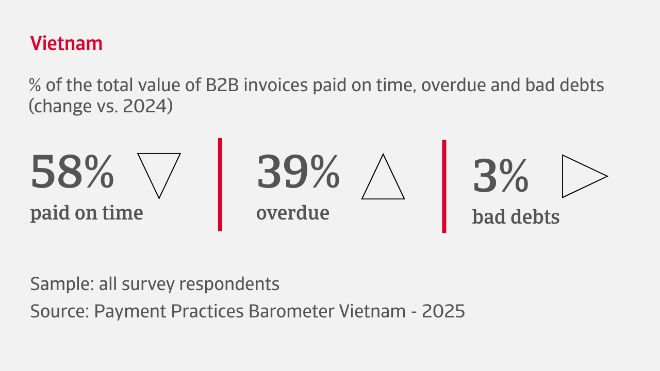
Growing switch toward benefits of strategic payment risk mitigation
The clear evidence of our survey is that companies in Vietnam are balancing optimism with caution as they manage an evolving B2B credit environment
54% of firms report improved payment behaviour among business-to-business (B2B) customers in recent months, suggesting better discipline in settling invoices. Overdue payments affect 39% of B2B invoices, with delays mainly attributed to customer liquidity issues. Bad debts affect 3% of B2B invoices, highlighting the financial exposure still faced by companies.
Appetite for B2B trade credit remains strong across industries in Vietnam, with a striking 75% of companies extending more credit to business customers in the past few months. This expansion comes alongside mixed payment policies, businesses almost evenly split between those lengthening, shortening, or maintaining their credit terms. 65% of all B2B sales are currently made on credit, with average payment terms of 45 days from invoicing.
What are the concerns for Vietnamese businesses in the coming months?
Widespread concern about potential surge in B2B customer insolvencies
The main concern for companies in Vietnam as they look to the second half of the year and beyond is the threat of rising insolvency risk. Our survey finds that 56% of businesses anticipate a surge in B2B customer insolvencies during the months ahead, a clear signal of growing worries about economic headwinds and global trade-related uncertainties. Despite this anxiety, however, many Vietnamese firms tell us they are cautiously optimistic about their overall financial resilience.
Three in five businesses report a positive outlook for working capital management, anticipating more opportunities to unlock cash tied up in receivables or inventory in the coming months. This forward-looking view also reflects a preparedness to adapt to possible changes in supplier payment terms, because some B2B suppliers are likely to shorten credit periods to protect their own liquidity positions. Days Sales Outstanding (DSO) remains a critical focus as companies seek to improve cash inflows by tightening payment collections and reducing delays.
The expected rise in B2B insolvencies is a clear signal for Vietnamese companies to stay vigilant, as late payments could strain cash flow and threaten financial stability in today’s shifting economy

Industry insights
Steel and metals
The steel and metals sector is highly reliant on trade credit, with 61% of B2B sales transacted on credit terms. Seven out of ten firms have expanded credit offerings to their business customers in recent months, while payment terms now average 43 days from issue. Overdue payments affect 35% of invoices and customers take one month beyond terms to settle, primarily due to liquidity shortages. Bad debts have stayed low, at an average 2% of B2B invoices, mitigating the impact of customer payment risk. Another positive development is that 55% of companies report shorter DSO, freeing up more cash from receivables.
Textile and clothing
66% of B2B sales are made on credit in the textile and clothing sector, highlighting the significance of trading on credit. Many companies are extending longer invoice settlement periods, and average payment terms stand at just over 40 days from invoicing. Overdue payments affect 34% of B2B invoices, with customers taking an additional month to settle accounts. The primary reasons for delays are liquidity challenges faced by customers and frequent supply chain disruptions. Bad debts average around 4% of B2B invoices, placing liquidity pressure on businesses. Most firms report shorter DSO and improved opportunity to free up cash from receivables.
Plastic and rubber
Companies in the plastic and rubber industry transact a striking 69% of their B2B sales on credit, and many firms are extending longer invoice settlement periods, with the average payment term standing at nearly 50 days from invoicing. Overdue payments impact 47% of B2B invoices, and customers typically take an additional month to settle overdue invoices. Delays are mainly due to customer liquidity issues. Bad debts average around 4%, adding to financial pressures. Most businesses report shorter DSO, but inventory turnover varies, with companies nearly equally divided between faster turnover, stock build-up, or stable levels. DPO is either steady or accelerated.
Interested in finding out more?
For a complete overview of the 2025 survey results for Taiwan, download the full report from the related documents section below.
To explore how these insights can strengthen your own credit risk strategy, get in touch with us and see how we can help you stay ahead.
- B2B trade credit remains a vital growth lever in Vietnam, where four in five businesses have actively expanded credit to their B2B customers
- To hedge against B2B customer payment risks, most companies combine in-house and insured risk management for B2B credit
- Our survey shows 56% of businesses expect B2B insolvencies to rise, signalling mounting uncertainty
- Widespread concern over shifting borrowing costs and bank finance access is pushing Vietnamese companies to keep a close eye on credit conditions



































